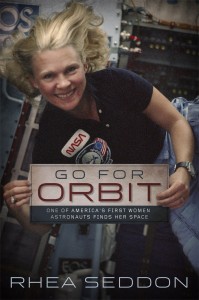Thought I Was Gonna Die
One of the things we had to master as new Astronauts was to be good back-seaters for the pilots in the planes part of the time. As they (and we) gained some confidence in our flying abilities they gave us more and more responsibilities. And of course, we had to learn how to handle emergencies. We had checklists with pages of what to do if something went wrong. Sometimes they did.
The pilots were training for a number of jobs, one of which was to join up with the Space Shuttle as it came in for landing. They called the job “chasing” the Shuttle. One day I was flying with my favorite pilot to fly with, Robert “Hoot” Gibson (who later became my husband). We were doing “chase practice” at Edwards Air Force Base where the first Shuttle landings would be.
It was a little weird to try to make a small T-38 jet fly like a big heavy Shuttle so some of them were modified with special equipment so they could simulate the speed of the descending Shuttle. The maneuver consisted of quickly pitching the nose of the T-38 up to slow down then deploy landing gear for aerodynamic drag. The jets didn’t like some of those abrupt maneuvers and there would be a hiccup as air was blocked from going down the engine and it could quit.
One day as Hoot and I were flying at Edwards AFB something unusual happened. We were flying at 35,000 feet altitude when we pulled up and as we pulled up and lurched to the left to rendezvous with our pretend target, things got very quiet. There was no engine noise. They had both quit.
At that altitude, the engines generate the cabin pressure. When we lost cabin pressure the oxygen system provided oxygen at a higher pressure. That made it difficult to talk. I knew Hoot would know what to do. I remembered from our training that losing both engines at altitude might not be a major problem as the engines could be restarted once we got down to a lower altitude. My heart pounded as we dove headlong toward the ground.
Hoot’s calm voice came from the front seat. “Why don’t you pull out your checklist and talk me through the procedure?” I knew he knew it by heart but it was his way of keeping me occupied. He also asked me if I remembered how to eject from the airplane. I did but sure hoped I wouldn’t have to.
When we got down to 25,000 feet the wind over the engine blades was enough to restart both engines and once again we had a flyable airplane. Back at the Officer’s Club at the base, Hoot used the old fighter pilot phrase that I’d heard before but had extra meaning for me that day. “Well, we cheated death one more time.” Whew!







Another wonder tidbit of exciting times!!!
Always love the stories!!
It’s so cool to read about you two working as a crew like that. Glad it all turned out OK – and made for a great story! Thank you for sharing with us.
Just part of the job and earning your pay check!
Could (had) a T-38 ever made a deadstick landing?
I just finished reading your book for the second time. The first one, was when it came out in 2016. I used to be a member of The National Space Institute, that later merged with the L5 Society, to become the National Space Society. There was a Western Regional Meeting of the NSI at NASA Ames Research Center in December 1982. That’s when I was a young 25 year old. I had always wanted to be an Astronaut, ever since Apollo 8 orbited the moon. I got to see your presentation at the meeting and took a photo of you, holding up a fresh photo of the STS-6 mission emblem, that you stated was released that morning. Well, the cards were never in my favor, and I missed my chance for college. Thou, I did have a very good 32+ year career, as a Letter Carrier at the USPS, in the Portland, Oregon metro area. And a year later, enjoying the beginning of my retirement. I just want to say, that it’s very nice to see people get to follow their dreams, and that Rhea & Hoot found their “soulmates,” and to raise a wonderful family. The reason it took me so long to read your book again, is because I have around 80 space books. Mostly of astronaut, and flight controllers biographies. More than most of the libraries. As the Latin phrase goes, “Ad Astra!’